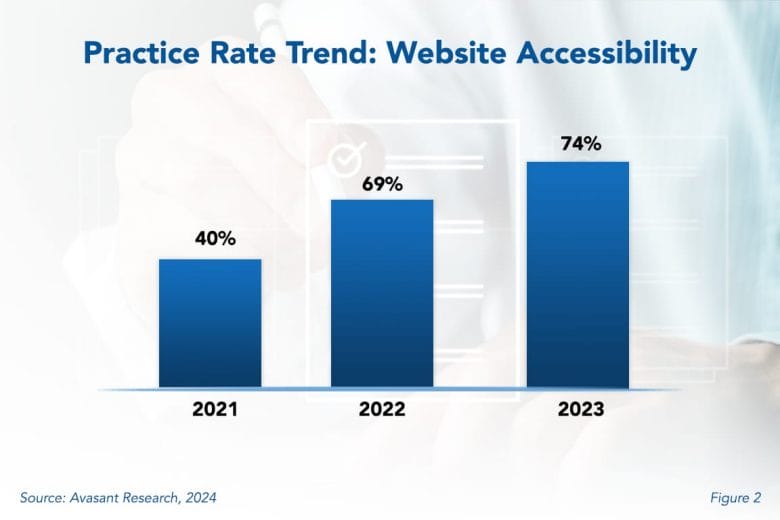Imagine reaching 1.3 billion new customers. That is the potential that organizations can unlock by making websites truly accessible. The World Health Organization reports this staggering number of people living with a disability who might be excluded from an online experience. So,web accessibility is not just about doing the right thing; it is also a strategic business decision with compelling benefits. It enables more customers to use your website, improving your economic reach. Moreover, a well-designed website accommodates all users, is easier to read, and improves SEO. The business case for web accessibility is clear.
As shown in Figure 2 from our full report, Website Accessibility Best Practices, almost three-quarters (74%) of all organizations attempt to make their websites accessible at any level of practice maturity. This is up from 69% in 2022. We expect the percentage to increase, judging by the number of organizations in the implementation stage.

Website accessibility means building and maintaining websites that anyone can use comfortably and effectively. It is about creating a welcoming online environment where people of diverse abilities are empowered to access information and fully engage in the digital space. Everyone, including those with visual, hearing, motor skills, neurological, or cognitive impairment, benefits when this practice is followed formally and consistently.
Moreover, the benefits of website accessibility programs go beyond those realized by people with disabilities. Accessible websites are also more intuitive and usable by those without disabilities. For example, all users benefit from sites that provide simple, top-down navigation or use color contrast that makes text more readable. Another plus: search engine optimization scores go up for sites that are more accessible. In other words, optimizing an organization’s website for people with disabilities makes it more useful and effective generally.
“Enterprise success is not solely driven by the latest technology but also a deep understanding of user needs,” said Asif Cassim, principal analyst for Avasant Research, based in Los Angeles. “Website accessibility is a commitment to identifying obstacles and implementing solutions to ensure every interaction is an inclusive experience.”
Website accessibility is essential for organizations that want to create the most inclusive experiences online—experiences that do not exclude anyone from finding, buying, and using products and services. Several commercial software vendors have made good progress in incorporating accessibility into their standard offerings. SAP, Oracle, Microsoft, and many others are building accessibility capabilities as part of their development frameworks. Additionally, in many cases, website accessibility is mandated by multiple industry standards and governmental regulations, such as the Americans with Disabilities Act (ADA) in the US and the Web Accessibility Directive in the European Union.
One clarification is in order. The focus of our full report is website accessibility only. It does not address the accessibility of enterprise applications used by employees internally. This does not mean that the latter is not important—in fact, it is an essential part of providing an inclusive workplace. However, we limited the scope of our survey to websites to get a sense of whether organizations are making progress in this early step in enabling accessibility. If an organization’s websites are not accessible, then it is unlikely that its internal systems are.
In our full report, we incorporate the views of four experts in this field. We also study the adoption and practice levels for website accessibility and examine those by organization size and sector. We conclude with practical recommendations for getting started with website accessibility.
Thanks to our reviewers who contributed substantially to the full report. These include Thomas Otter, founder of Otter Advisory; Laurie Henneborn, managing director for Accenture Research; Jeff Nolan, global marketing director at Coherent Corp.; and Jon Reed, co-founder of Diginomica.

